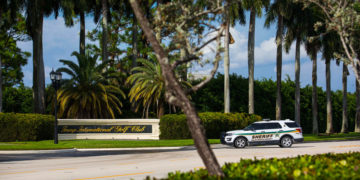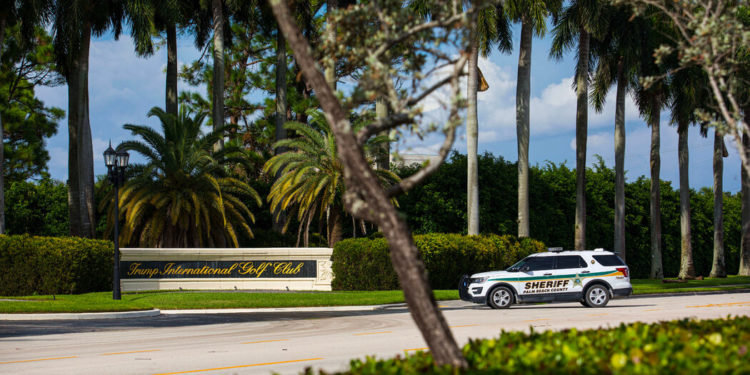The acting director of the Secret Service told former President Donald J. Trump that significant additional security arrangements and planning would be needed if he wanted to continue safely playing golf, according to three people with knowledge of their conversation.
The agency’s acting director, Ronald L. Rowe Jr., made the recommendation at a meeting with Mr. Trump on Monday afternoon in the former president’s office at Mar-a-Lago, his private club and home in Palm Beach, Fla.
The meeting came just 24 hours after a second apparent assassination attempt on the former president in the span of just two months. And it also comes at a time when, behind the scenes, tensions between the Trump campaign and the Secret Service have been escalating.
Mr. Trump asked Mr. Rowe whether it was safe for him to keep playing golf, one of the people said. Mr. Rowe discussed the difficulties of securing sprawling golf courses near public roads and said that some of Mr. Trump’s courses were easier to protect than others, one of the people said.
It is unclear what changes Mr. Trump will make to his golf schedule after the meeting, and some people in Mr. Trump’s orbit are frustrated at any notion he might have to cut back on his weekly activity. They questioned why President Biden was able to visit open beaches but Mr. Trump should have to restrict his golf, especially given that other former presidents regularly play the sport.
However, Mr. Trump and Mr. Biden do not receive the same level of security. One of them is a sitting president and one is a former president. Mr. Trump’s level of Secret Service protection reduced after he left the White House. But since the first attempt on Mr. Trump’s life in July in Butler, Pa., both Republican and Democratic lawmakers have raised concerns about the former president’s protection, given the current intensity of threats. Mr. Biden has called on the Secret Service to provide whatever additional resources are required to keep Mr. Trump safe.
Golf remains more than a pastime for Mr. Trump — it’s a major part of his identity as well as a way of socializing and a release valve as he faces a presidential campaign and ongoing legal woes.
On Sunday, a suspected gunman, Ryan W. Routh, allegedly hid for 12 hours near the Trump International Golf Club in West Palm Beach, the F.B.I. has said. After a Secret Service agent spotted Mr. Routh poking the barrel of a gun through bushes on the course’s perimeter, that agent opened fire, leading Mr. Routh to run to his car, officials have said.
Mr. Routh left behind a semiautomatic rifle, a scope, two backpacks and a Go-Pro camera, which suggested he intended to film an intended shooting, officials said. The police pulled him over on the side of the Interstate 95 about 45 minutes after a witness, who saw him fleeing, photographed his license plate.
In their meeting on Monday, Mr. Rowe told Mr. Trump that it was difficult to secure his sprawling golf courses because they have so much open space, one of the people briefed on the meeting said.
The courses are close to public roads and the fact that photographers, using long-range lenses, can often capture Mr. Trump on his greens and fairways suggest that a skilled gunman might be able to get a clear line of sight on him. Mr. Trump raised some of these concerns himself in the meeting with Mr. Rowe, one of the people with knowledge of the meeting said.
Mr. Rowe told Mr. Trump that the Secret Service views the golf course at Joint Base Andrews as easier to secure than some of his courses, because it’s a military course, two of the people said. Barack Obama frequently played there during his presidency.
Given Mr. Trump’s campaign schedule, which is expected to be busier as the November election draws near, it is unclear how much golf he will be able to play in the final 49 days, an adviser said.
A campaign spokeswoman, Danielle Alvarez, declined to comment on Monday’s private briefing. She noted Mr. Trump’s Sunday post on social media, in which he praised the Secret Service and law enforcement.
“It was certainly an interesting day!” Mr. Trump wrote on his social-media platform Truth Social, adding in all-caps, “The job done was absolutely outstanding.”
In a private conversation shortly after the assailant disrupted his game, Mr. Trump told Senator Lindsey Graham that his Secret Service team had been “awesome,” Mr. Graham, Republican of South Carolina, later recalled.
But while Mr. Trump has repeatedly praised the agents on his personal detail since the first assassination attempt in July, his team has complained that the agency has not provided the former president with the level of resources the campaign has requested.
A spokesman for the Secret Service said that Mr. Rowe declined to comment on private conversations involving someone the agency protects.
Mr. Trump owns or leases a number of courses, including three in Florida, as well as one in New Jersey, one in Westchester County in New York, one in Sterling, Va., two courses in Scotland and one in Ireland, and a new one in the Middle East. He plays every week and takes great pride in it, describing it as his main form of exercise.
Aides to Mr. Trump have described golf as an important form of relaxation for him. When he was cooped up in a Manhattan courtroom for his hush-money trial earlier this year, his advisers were eager for him to spend as much time as possible outdoors on his golf courses.
As president, Mr. Trump often used his Virginia club, and sometimes took lawmakers out on the golf course with him. Since leaving the presidency, Mr. Trump has played his courses with sports figures, donors and supporters, and mingles openly with people in the club dining rooms. The golf courses have been one of Mr. Trump’s steadiest streams of income.
After the first assassination attempt in July, when a 20-year-old man, Thomas Crooks, came within inches of killing Mr. Trump at a rally in Butler, Mr. Trump told allies that the Secret Service had concerns about him playing golf. But Mr. Trump continued to play.
The Secret Service has come under harsh scrutiny over security lapses that allowed Mr. Crooks to crawl onto a warehouse rooftop at the July 13 rally in Butler and fire off eight rounds at Mr. Trump, wounding his ear and killing a spectator in the crowd behind him. The agency appears to have narrowly averted another shooting at Mr. Trump on Sunday by posting agents ahead of the former president to scout out his next holes on the golf course. Agents were able to spot and shoot at the would-be assailant before he could fire his own weapon through the shrubbery.
The alleged assailant, Mr. Routh, has been known to U.S. authorities in recent years. A contractor and occasional social activist, Mr. Routh has a significant criminal record, including a 2002 conviction in North Carolina for possessing a weapon of mass destruction, which court records describe as explosives with a blasting cap and detonation cord.
Mr. Trump has also been the target of foreign assassination plots, particularly from Iran. U.S. officials obtained information about an Iranian plot to assassinate Mr. Trump in the weeks ahead of the Butler rally, although the plot did not appear connected to the shooting that took place.
The former head of the Secret Service, Kimberly A. Cheatle, resigned her post amid widespread criticism of the agency over the Butler attack.
The acting director of the Secret Service, Mr. Rowe, said in a Monday news conference that “the protective methodologies of the Secret Service were effective yesterday,” but he also made it clear that the agency did not search the golf course’s perimeter before Mr. Trump began his round.
“The president wasn’t even really supposed to go there,” Mr. Rowe said. “It was not on his official schedule.”
But it is well-known that Mr. Trump frequently plays golf at his course in West Palm Beach when he’s staying at Mar-a-Lago. It remains unclear why no perimeter search was conducted.
The post Secret Service Told Trump It Needs to Bolster Security if He Keeps Golfing appeared first on New York Times.



















